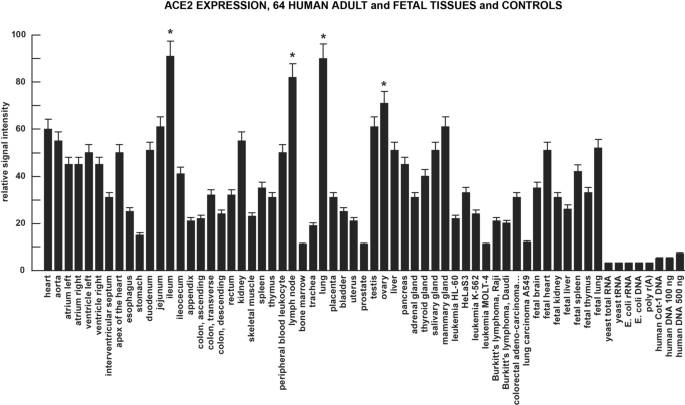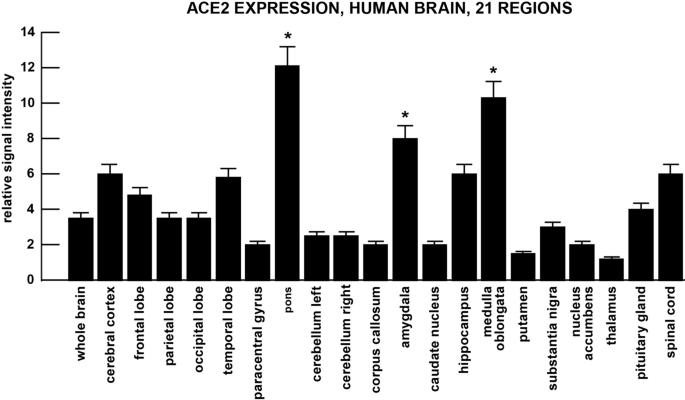COVID-19 Research Shows That SARS-CoV-2 Multipronged Attack Is Due To Extensive ACE2 Presence In Various Organs And Tissues In Human Host
Source: COVID-19 Research Aug 29, 2020 5 years, 3 months, 3 weeks, 4 days, 21 hours, 50 minutes ago
COVID-19 Research: A detailed study of ACE2, the gateway receptor for SARS-CoV-2 led by Dr Walter Lukiw, Ph.D., Professor of Neuroscience, Neurology and Ophthalmology at LSU Health New Orleans' Neuroscience Center of Excellence and School of Medicine, may help explain the wide variety of symptoms and organs involved with SARS-CoV-2 infection and COVID-19.
.jpg)
The study results suggest that a multi-organ infection with SARS-CoV-2 may be via the angiotensin-converting enzyme 2 (ACE2) receptor, which is found almost everywhere throughout the body.
Just in the brain alone the researchers found 21 different regions of the brain that had the presence of ACE2 receptors while a study of 85 different types of human tissues from different parts of the body and organs showed that more than 56 contained ACE2 receptors in relatively high amounts. (It must be noted that prior to COVID-19, there were not much studies or focus on ACE2 receptors.)
 Tissue-specific patterns of ACE2 expression are a strong indicator of gene function and susceptibility to SARS-CoV-2 invasion and the development of CoV-19. High ACE2 expression in vascular, gastrointestinal (GI) tract, respiratory, excretory and reproductive tissues and some relevant cancers and controls; the highest values of expression were found in the heart (both adult and fetal), ileum, kidney, lung (both adult and fetal), testes, ovary and mammary gland
Tissue-specific patterns of ACE2 expression are a strong indicator of gene function and susceptibility to SARS-CoV-2 invasion and the development of CoV-19. High ACE2 expression in vascular, gastrointestinal (GI) tract, respiratory, excretory and reproductive tissues and some relevant cancers and controls; the highest values of expression were found in the heart (both adult and fetal), ileum, kidney, lung (both adult and fetal), testes, ovary and mammary gland
The study findings are published in the journal Cellular and Molecular Neurobiology.
https://link.springer.com/article/10.1007/s10571-020-00947-7
In order to better understand the mechanism and pathways of SARS-CoV-2 infection and susceptibility to specific cell and tissue types as well as organ systems, the study team analyzed 85 human tissues for the presence of ACE2 receptors.
ACE2 is a protein that is found on the surface of many immune and nonimmune cell types. An enzyme, it is part of the system that regulates blood pressure and fluid and electrolyte balance. It may also help regulate cardiovascular, neurovascular and renal function, as well as fertility. ACE2 receptors act like locks on cells, and the SARS-CoV-2 spike proteins act like keys that open the locks letting the virus enter cells to rapidly multiply.
Besides controls, tissues tested included lung, digestive, renal-excretory, reproductive, eye tissues, and 21 different regions of the brain.
Dr Lukiw told Thailand Medical News, "Besides strong ACE2 expression in respiratory, digestive, renal-excretory and reproductive cells, high ACE2 expression was also found in the amygdala, cerebral cortex and brainstem."
He added, "This may help explain cognitive deficits associated with SARS-CoV-2 infection. Some of the highest ACE2 expression levels were found in the pons and medulla oblongata in the human brainstem, an anatomical region of the brain containing the medullary
respiratory centers, and this may in part explain the susceptibility of many CoV-19 patients to severe respiratory distress."
The researchers further noted that ACE2 receptor activity was also easily detected in the eye, suggesting that the visual system may provide an additional entry point for SARS-CoV-2 invasion and that under certain conditions, eyeglasses or face shields may be as important as face masks in reducing SARS-CoV-2 transmission and infection.
Dr Lukiw further added, "Several important research gaps remain. A real danger of SARS-CoV-2 infection is not only its highly transmissible and contagious nature and lethality, but also its simultaneous and multipronged attack on many human cell and tissue types involving vital and critical respiratory, immunological, vascular, renal-excretory and neural systems as well as an unprecedented coordinated disruption of the complex neurophysiology, neurochemistry, neurobiology and neurology of the cells of the brain and central nervous system (CNS) that normally regulate these multiple physiological systems."
 ACE2 expression in 21 anatomical regions of the human brain. The highest expression of the SARS-CoV-2 receptor ACE-2 was found in the amygdala, pons and medulla oblongata; the later two regions contain the respiratory control centers of the brain; considerable expression of ACE2 in the brain, temporal lobe and hippocampus may in part explain neurological disruption and cognitive dysfunction associated with SARS-CoV-2 infection
ACE2 expression in 21 anatomical regions of the human brain. The highest expression of the SARS-CoV-2 receptor ACE-2 was found in the amygdala, pons and medulla oblongata; the later two regions contain the respiratory control centers of the brain; considerable expression of ACE2 in the brain, temporal lobe and hippocampus may in part explain neurological disruption and cognitive dysfunction associated with SARS-CoV-2 infection
Thailand Medical News points out that also of concern is the fact that ‘recovered’ COVID-19 patients need to have constant health screenings as viral reservoirs that are not detectable by current nasal swab tests might be present and could continue to cause tissue and organ damage and cellular pathway disruptions, leading to a host of medical conditions that can occur but might seemed to be not linked to COVID-19.
For more
COVID-19 Research, keep on logging to Thailand Medical News.
.jpg)

